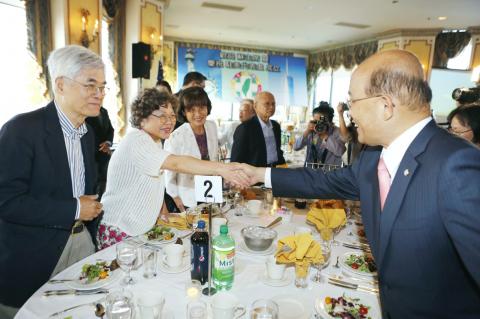The Democratic Progressive Party (DPP) will be pragmatic in handling domestic affairs and is capable of managing relations across the Taiwan Strait, DPP Chairman Su Tseng-chang (蘇貞昌) told Taiwanese-Americans in New York on Sunday, according to a DPP press release.
Su, who is visiting North America until Tuesday next week, also said in a speech at a dinner banquet that while some people are not happy with the nation’s current name, the Republic of China, as stipulated in the Constitution, “hopefully, someday we could engage the international community using the name Taiwan.”
Addressing domestic politics, Su said that the DPP has set high goals of winning a planned national referendum on the construction of the Fourth Nuclear Power Plant in Gongliao District (貢寮), New Taipei City (新北市), this year and the seven-in-one local elections next year, but the party would be patient and pragmatic in its policy formulation and would put forward concrete actions rather than offering lip services as the administration of President Ma Ying-jeou (馬英九) has done.

Photo: Chen Wei-min, Taipei Times
That is why the party has released a defense blue paper, a pension reform plan based on social equality and has organized a series of “open studio” forums on social and national affairs, Su added.
On external affairs, Su highlighted his initiative of a democratic alliance, which he said would consolidate international support for Taiwan, while balancing out Taiwan’s overdependence on China during Ma’s term.
However, the DPP is aware that the international community is watching if the party is capable of handling cross-strait relations, he said, adding that the DPP has been seeking further engagement with China — not only with Beijing, but also the Chinese people and its civil society.
Su elaborated on his recent comment in an interview, in which he was quoted as saying that working on Taiwanese independence would be “unnecessary” because Taiwan — unlike Xinjiang and Tibet — is a de facto independent and sovereign nation.
The DPP’s landmark Resolution on Taiwan’s Future, which was passed in 1999, defines Taiwan as a sovereign nation separate from China, while acknowledging the Republic of China as the country’s current formal title, he said.
“While some people are unhappy with it, it is the ‘status quo,’” Su said.
“We could change it by a democratic process [in the future], but we must accept the status quo before it is changed,” Su added.
The party’s latest survey showed that 55 percent of respondents supported Taiwanese independence, with the support rate among female respondents higher than that among men, said Wu Hsiang-jung (吳祥榮), director of the DPP’s poll center, who is accompanying Su on the trip.
Support for Taiwan’s independence has increased under Ma’s administration, as has the number of people who identify themselves as Taiwanese, at 75.6 percent, Wu said.
The DPP is cautiously optimistic about the major elections in the next three years as 41 percent of those polled said they would vote for DPP candidates in the seven-in-one elections next year against 23.9 percent who said they would favor Chinese Nationalist Party (KMT) candidates.
For the 2016 presidential election, 44.9 percent of respondents were in favor of the DPP, while 23.5 percent signaled support for the KMT, Wu said.
Su, who arrived in New York after his first stop in Los Angeles, is scheduled to visit Houston, Washington, Toronto and Vancouver before returning to Taiwan.

Taipei has once again made it to the top 100 in Oxford Economics’ Global Cities Index 2025 report, moving up five places from last year to 60. The annual index, which was published last month, evaluated 1,000 of the most populated metropolises based on five indices — economics, human capital, quality of life, environment and governance. New York maintained its top spot this year, placing first in the economics index thanks to the strength of its vibrant financial industry and economic stability. Taipei ranked 263rd in economics, 44th in human capital, 15th in quality of life, 284th for environment and 75th in governance,

Greenpeace yesterday said that it is to appeal a decision last month by the Taipei High Administrative Court to dismiss its 2021 lawsuit against the Ministry of Economic Affairs over “loose” regulations governing major corporate electricity consumers. The climate-related lawsuit — the first of its kind in Taiwan — sought to require the government to enforce higher green energy thresholds on major corporations to reduce emissions in light of climate change and an uptick in extreme weather. The suit, filed by Greenpeace East Asia, the Environmental Jurists Association and four individual plaintiffs, was dismissed on May 8 following four years of litigation. The

A former officer in China’s People’s Liberation Army (PLA) who witnessed the aftermath of the 1989 Tiananmen Square massacre has warned that Taiwan could face a similar fate if China attempts to unify the country by force. Li Xiaoming (李曉明), who was deployed to Beijing as a junior officer during the crackdown, said Taiwanese people should study the massacre carefully, because it offers a glimpse of what Beijing is willing to do to suppress dissent. “What happened in Tiananmen Square could happen in Taiwan too,” Li told CNA in a May 22 interview, ahead of the massacre’s 36th anniversary. “If Taiwanese students or

The New Taipei City Government would assist relatives of those killed or injured in last month’s car-ramming incident in Sansia District (三峽) to secure compensation, Mayor Hou You-yi (侯友宜) said yesterday, two days after the driver died in a hospital. “The city government will do its best to help the relatives of the car crash incident seek compensation,” Hou said. The mayor also said that the city’s Legal Affairs, Education and Social Welfare departments have established a joint mechanism to “provide coordinated assistance” to victims and their families. Three people were killed and 12 injured when a car plowed into schoolchildren and their